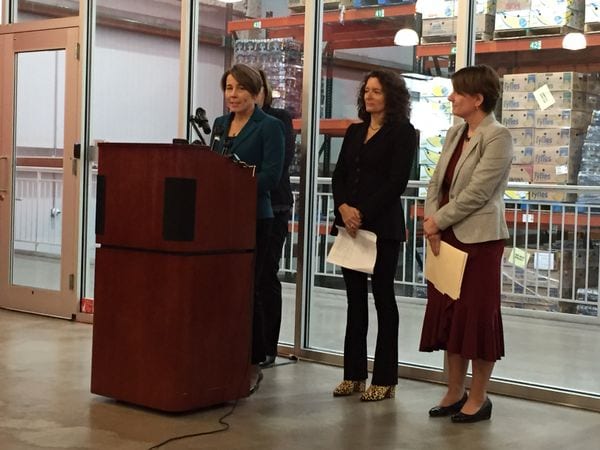
January 10, 2019
Massachusetts AG Maura Healey gives $3 million to address social factors that affect health
By Shira Schoenberg | sschoenberg@repub.com
January 8, 2018
BOSTON — Housing. Legal services. Walking paths.
While these things are not typically thought of as health care, they do have a significant impact on people’s health.
Massachusetts Attorney General Maura Healey on Tuesday announced $3 million in grants to 13 community organizations that address things like housing, hunger and other societal factors that affect someone’s health. Healey announced the grants at an event at the Greater Boston Food Bank.
The effort is a way to address what are called “social determinants” of health, factors that are often tied to wealth, employment, education and other social and cultural factors. These include things like access to healthy food and the ability to exercise.
“For too long, our health care system has focused on people after they get sick,” Healey said. “It’s time for us across the state to really flip the script, to give families and communities the resources they need on the front end to be healthy and stay healthy.”
One Associated Press report looked at lifespan by census tract and found that in Massachusetts, for example, poor and rich neighborhoods have vastly different life expectancies.
A second report, based on death data from the Department of Public Health, shed light on the health disparities between black Massachusetts residents and the rest of the population.
In both these cases, experts say the disparities are likely due to social factors. For example, people who have more education are likely to earn higher wages and can live in communities that have grocery stores that carry fresh produce and have safe parks to walk in. Stress caused by financial difficulties can hurt someone’s health.
The new grants will fund partnerships between a range of social service agencies and health care providers. They are paid for with money from settlements reached by the attorney general’s health care division.
In Western Massachusetts, Baystate Health Care Alliance and the BeHealthy Partnership ACO will receive a $250,000 grant to launch a partnership with Community Legal Aid, in which lawyers will be stationed at community health centers to help medical patients who have legal needs.
For example, legal aid lawyer Faye Rachlin said a child may be hungry because her mother was wrongfully cut off from food stamps, a child may need help getting special education services or an abuse victim may need a restraining order.
Kerry LaBounty, of the BeHealthy Partnership ACO, said the lawyers will educate patients on life skills, like being a good tenant. They will work with doctors so the doctors know who to call when a patient needs an attorney.
Community Action Pioneer Valley, the Community Health Center of Franklin County and the Center for Human Development are getting a $250,000 grant to offer mental health support to high-risk adolescents and young adults in Franklin County.
The Collaborative for Educational Services is working with the Hilltown Community Health Center, Hilltown Community Development Corporation and Pioneer Valley Planning Commission to develop a mobile farmers market tailored to the rural Hilltowns. The group will also develop walking maps of accessible, easy walking routes in six Hilltowns and will work with municipalities to develop infrastructure that encourages walking, like better sidewalks and crosswalks. It is getting a $150,000 grant.
Sarah Bankert of the Collaborative for Educational Services said the goal is “to help people access physical activity in a way that’s very easy and fun and cheap.”
One statewide project that will affect Western Massachusetts is being run by the Massachusetts Housing and Shelter Alliance in partnership with Community Healthlink in Worcester, Duffy Health Center in Hyannis and Mercy Medical Center – Health Care for the Homeless Program in Springfield. Community health workers will be stationed at each medical center to work with chronically homeless patients with complex medical needs. The workers will help these individuals navigate the medical system and also find permanent, stable housing with ongoing support services.
Other programs receiving funding in other parts of the state will provide help finding housing for homeless pregnant and postpartum women, support for families of people addicted to drugs, music therapy to engage at-risk adolescents and modifications to the homes of elderly people at risk of falls, among other services.
Read this story on Masslive.com

















































